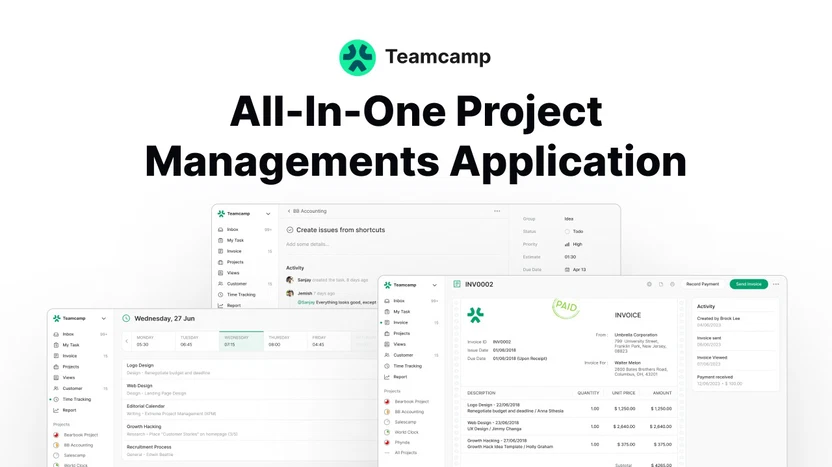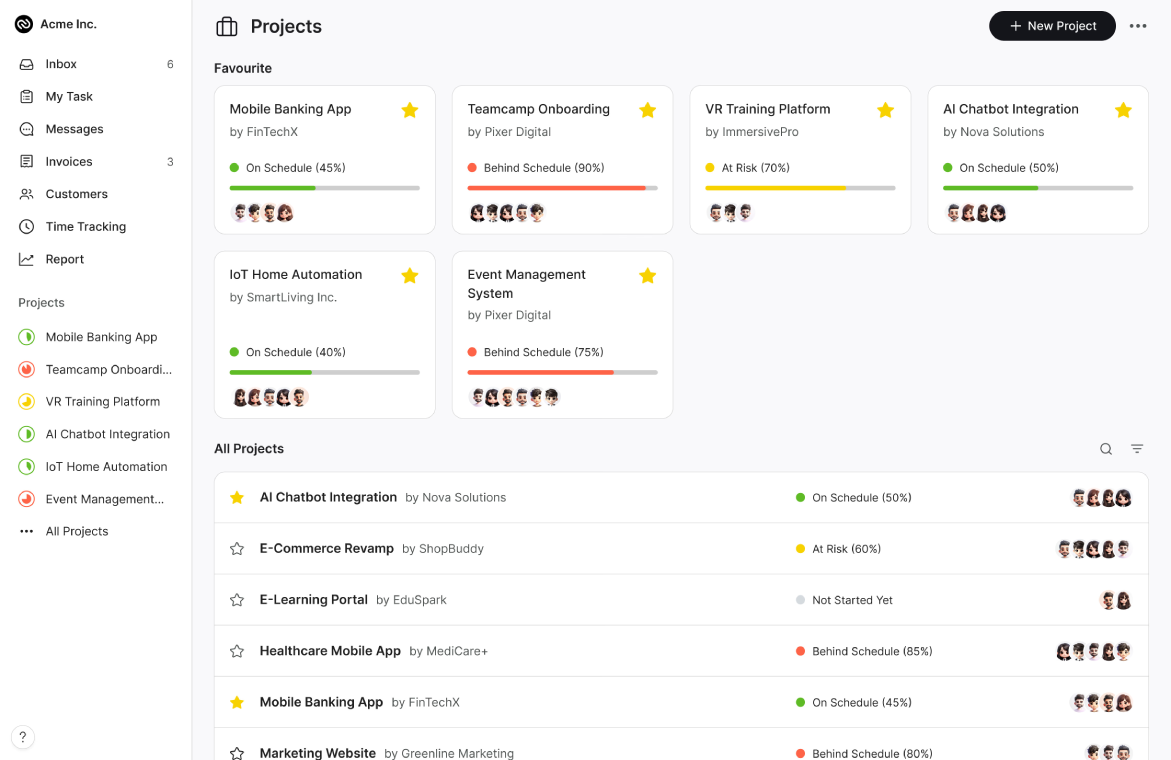10 Proven Productivity Hacks for Developers in 2025: Work Smarter, Code Faster
Table of contents
- 1. Embrace AI Coding Assistants
- 2. Implement Time Blocking for Deep Work
- 3. Adopt Modern IDEs and Development Environments
- 4. Automate Repetitive Tasks
- 5. Combat Burnout Proactively
- 6. Eliminate Time Wasters
- 7. Use Integrated Project Management Tools
- 8. Implement Real-Time Feedback Loops
- 9. Foster Psychological Safety
- 10. Measure What Matters
- How Teamcamp Enhances Developer Productivity
- Building a Productivity-Focused Developer Culture
- Conclusion: Your Path to Enhanced Productivity

Let's face it—writing code isn't just about typing faster. As developers in 2025, we're juggling multiple projects, fighting distractions, and trying to stay sane while delivering quality work on time. With recent studies showing that 83% of software developers experience burnout, finding ways to work smarter has never been more critical.
I've spent years refining my productivity workflow, testing countless tools and techniques. The good news? You don't need to reinvent the wheel. These battle-tested productivity hacks will help you reclaim your time and mental bandwidth, allowing you to focus on what matters most—writing great code.
1. Embrace AI Coding Assistants

AI coding tools have evolved dramatically in 2025. They're no longer just glorified autocomplete—they're genuine development partners.
GitHub Copilot has become particularly powerful, offering intelligent code suggestions that range from completing the current line to generating entire code blocks. What makes these tools game-changing is their ability to handle routine coding tasks while you focus on solving complex problems.
Pro tip: Use AI assistants for generating boilerplate code and documentation, but always review their output. The goal is augmentation, not replacement.
2. Implement Time Blocking for Deep Work

Context switching is a productivity killer for developers. Studies show that it can take up to 23 minutes to regain focus after an interruption.
Try the time blocking technique:
Dedicate specific blocks of time (60-90 minutes) to focused coding
Turn off notifications during these periods
Use the Pomodoro technique (25 minutes of work followed by a 5-minute break) if you struggle with longer sessions
"Developers often feel like they're not productive enough. Most of the time, it's not true. Use a free time tracker to record the time you've spent on tasks and document important actions and milestones," suggests Jane, a senior developer.
3. Adopt Modern IDEs and Development Environments

Your choice of development environment directly impacts your productivity. Modern IDEs offer comprehensive toolsets that significantly boost efficiency through:
Real-time error detection and quick fixes
Smart code completion and refactoring tools
Built-in debugging capabilities
Integrated testing frameworks
JetBrains IntelliJ IDEA stands out with its advanced code analysis and refactoring capabilities, while Microsoft Visual Studio excels with enterprise-grade debugging features. For those who prefer a cloud-based approach, Replit has evolved into a comprehensive development platform with powerful collaborative features.
4. Automate Repetitive Tasks

Automation remains one of the most underutilized productivity hacks. In 2025, build automation tools have become even more powerful.
Gradle, with over 50 million downloads monthly, automates projects of all sizes with incremental builds that only touch parts of the project that have changed. For workflow automation, tools like Exaflow optimize CI/CD processes, automate deployments, and manage complex workflows efficiently.
Quick win: Identify three repetitive tasks in your workflow this week and automate them. Even saving 10 minutes per day adds up to over 40 hours per year.
5. Combat Burnout Proactively
Developer burnout is at epidemic levels, with 76% of workers reporting experiencing it. The leading causes? High workloads (47%), inefficient processes (31%), and unclear goals (29%).
Prevention strategies that actually work:
Implement regular breaks using the Pomodoro technique
Establish clear boundaries between work and personal time
Prioritize physical activity and adequate sleep
Practice mindfulness and stress-reduction techniques
Remember that burnout isn't just about feeling tired—it manifests as chronic fatigue, reduced productivity, increased cynicism toward work, and emotional exhaustion.
6. Eliminate Time Wasters

Developers identified these primary causes of wasted time:
Technical debt (59%)
Insufficient documentation (41%)
Build processes (27%)
Lack of time for deep work (27%)
Lack of clear direction (25%)
To combat these issues, dedicate regular time to addressing technical debt, invest in high-quality documentation, and block focused work time on your calendar.
7. Use Integrated Project Management Tools

Context switching between different tools drains productivity. Modern developers are turning to integrated platforms that consolidate everything they need in one place.
Teamcamp has emerged as a standout project management tool in 2025, specifically designed for development teams seeking to balance productivity with autonomy. Unlike traditional project management solutions, it consolidates tasks, documents, and discussions into one platform for seamless collaboration.
Organizations using Teamcamp report impressive results:
3.2x increase in client satisfaction
28% faster project delivery
32% reduction in administrative work
42% lower overhead costs
8. Implement Real-Time Feedback Loops
Waiting until the end of a sprint to discover issues is inefficient. Instead, integrate systems like observability tools and error tracking directly into your development workflow.
These real-time feedback loops allow you to identify and address issues quickly, reducing debugging time and improving code quality. The faster you can detect and fix problems, the less technical debt you accumulate.
9. Foster Psychological Safety
The foundation of developer productivity is psychological safety—the ability to take risks without feeling insecure or embarrassed. Teams with high psychological safety consistently outperform those without it.
To foster psychological safety:
Encourage open communication
Normalize failure as part of the learning process
Recognize and celebrate contributions
Provide constructive feedback
10. Measure What Matters
Traditional productivity metrics like lines of code are misleading. Instead, focus on impact metrics that actually matter:
Lead time: The time from task creation to deployment
Cycle time: The time from starting work to completion
Flow efficiency: The ratio of active work time to total elapsed time
Developer satisfaction: Regular surveys to gauge team well-being and engagement
The SPACE framework, widely adopted in 2025, provides a more holistic approach by measuring productivity across five dimensions: satisfaction and well-being, performance, activity, communication, and efficiency.
How Teamcamp Enhances Developer Productivity

Teamcamp has become a game-changer for development teams in 2025. It brings everything developers need into one place, allowing teams to seamlessly manage projects, collaborate effectively, and keep stakeholders in the loop.
Key features that boost developer productivity:
Unified Project Dashboard: A centralized view of all projects, tasks, and resources with real-time updates
Milestone & Deadline Tracking: Clear visibility into project timelines
Task Prioritization: Intuitive tools to focus on what matters most
Custom Task Status: Workflows that adapt to your team's unique processes
What sets Teamcamp apart is its focus on autonomy. Unlike traditional project management tools that can feel like micromanagement, Teamcamp provides visibility without sacrificing developer freedom.
"Teamcamp has streamlined our projects like never before! With all our workflows, timelines, and client communications in one place," says Angelo Austin, CEO of Austin Media Group.
Building a Productivity-Focused Developer Culture
Creating a culture that values both productivity and developer well-being requires thoughtful leadership:
Set Clear Goals & Objectives: Define measurable and achievable targets to align everyone's expectations
Define Roles & Responsibilities: Assign specific tasks to prevent overlaps and ensure efficient execution
Foster Effective Communication: Ensure seamless collaboration between stakeholders
Embrace Continuous Improvement: Learn from past projects to enhance future outcomes
Conclusion: Your Path to Enhanced Productivity
As we navigate through 2025, developer productivity continues to evolve with emerging technologies and methodologies. The most successful development teams will be those that embrace the right combination of tools, strategies, and cultural practices.
By implementing these proven productivity hacks and leveraging powerful platforms like Teamcamp, you can dramatically increase your output while maintaining code quality and your sanity.
Ready to transform your development workflow? Explore how Teamcamp can help you collaborate more effectively, reduce administrative overhead, and deliver projects faster. Your path to enhanced developer productivity starts here.
Subscribe to my newsletter
Read articles from Teamcamp - All in One Project management Software directly inside your inbox. Subscribe to the newsletter, and don't miss out.
Written by

Teamcamp - All in One Project management Software
Teamcamp - All in One Project management Software
Teamcamp is an all-in-one project management platform designed to streamline workflows, enhance collaboration, and boost productivity for teams of all sizes. With features like simplified planning, real-time updates, customizable workflows, and visual progress tracking, it adapts to the unique needs of Marketing, Sales, HR, and more. Born from a vision to simplify project management, Teamcamp empowers 250+ global teams with tools that foster transparency, efficiency, and seamless integration with third-party apps. It’s your trusted partner for achieving project success.
